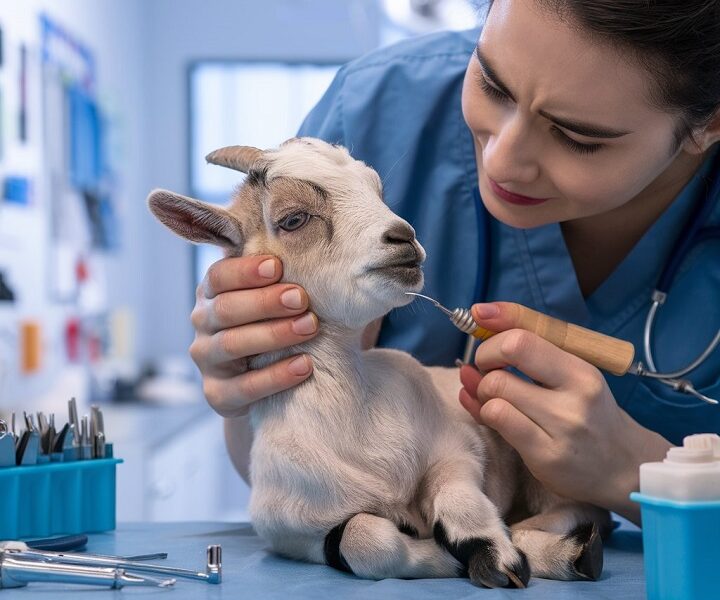Raising healthy baby goats is a rewarding experience, but it’s not without its challenges. One common issue that can arise is trauma to the teeth, which can be painful and lead to long-term problems if not properly addressed. In this article, we’ll explore the causes of tooth trauma in baby goats, the signs to look for, and the steps to take for effective treatment.
Causes of Tooth Trauma in Baby Goats
Baby goats are curious and playful creatures, and their natural inclination to explore the world can sometimes lead to accidents. Common causes of tooth trauma include:
– Falling or colliding with hard surfaces
– Chewing on rough or sharp objects
– Fights or scuffles with other young goats
Recognizing the Signs of Tooth Trauma
Identifying tooth trauma in baby goats is crucial for prompt treatment and prevention of further complications. Keep an eye out for the following signs:
– Reluctance to eat or drink
– Excessive drooling
– Sensitivity or pain when the mouth is touched
– Visible cracks, chips, or discoloration in the teeth
Assessing the Extent of the Injury
When a baby goat experiences tooth trauma, it’s important to assess the extent of the injury. Some common types of tooth injuries include:
– Cracks or chips in the enamel
– Exposed pulp (the soft inner part of the tooth)
– Abscesses or infections
– Completely knocked-out teeth
Treating Tooth Trauma in Baby Goats
The appropriate treatment for a baby goat’s tooth trauma will depend on the severity of the injury. Here are some common treatment options:
Minor Enamel Damage
– Clean the affected area with a soft, damp cloth.
– Apply a small amount of dental wax or sealant to protect the exposed area.
– Monitor the tooth for any further complications.
Exposed Pulp
– Gently rinse the affected area with a dilute antiseptic solution.
– Apply a topical antibiotic ointment to the exposed pulp.
– Consider consulting a veterinarian for further treatment, as the tooth may need to be extracted or root canaled.
Abscesses or Infections
– Consult a veterinarian immediately, as these conditions require prompt medical attention.
– The veterinarian may prescribe antibiotics and/or perform a tooth extraction or other procedure.
Cracked Teeth
– Consult a veterinarian, as the tooth may need to be extracted or replaced with a prosthetic.
Preventing Tooth Trauma in Baby Goats
To reduce the risk of tooth trauma in your baby goats, consider the following preventative measures:
– Provide a safe, goat-proofed environment free of sharp or hard objects.
– Offer plenty of soft, palatable forage and hay to encourage natural chewing behaviors.
– Closely supervise young goats during playtime to intervene in any rough interactions.
– Regularly trim the goats’ hooves to maintain proper alignment and bite.
Absolutely, here are more details on the potential long-term effects of untreated tooth trauma in baby goats:
Long-Term Consequences of Untreated Tooth Trauma
Chronic Pain and Discomfort
If left untreated, tooth injuries in baby goats can lead to persistent pain and discomfort. The exposed pulp or damaged tooth structure can cause the goat to be reluctant to eat, leading to weight loss and poor overall health.
Infection and Abscess Formation
Untreated tooth trauma provides an entry point for bacteria, which can lead to serious infections and the formation of abscesses. These abscesses can be extremely painful and, if left unchecked, can spread to other areas of the mouth or face.
Impaired Eating and Malnutrition
Severe tooth pain or missing teeth can make it very difficult for baby goats to chew and swallow food properly. This can result in the goat not getting the necessary nutrients and calories, leading to malnutrition, stunted growth, and poor overall condition.
Malocclusion and Jaw Deformities
If a damaged or missing tooth is not addressed, it can cause the remaining teeth to shift out of their proper alignment. This malocclusion can lead to further dental problems and even changes in the shape and structure of the jaw itself.
Increased Risk of Future Dental Issues
Unresolved tooth trauma in baby goats can also increase the likelihood of developing other dental problems later in life, such as premature tooth loss, gum disease, and even tooth root abscesses.
Compromised Immune System
The stress and pain of untreated tooth trauma can also weaken a baby goat’s immune system, making them more susceptible to other illnesses and infections.
To avoid these long-term consequences, it’s crucial to address any tooth injuries in baby goats promptly and under the guidance of a veterinarian. Early treatment can help prevent further complications and ensure the goat’s overall health and well-being.
tips for closely monitoring a baby goat with untreated tooth trauma to ensure its health and well-being:
-
Conduct Regular Oral Examinations:
– Gently inspect the goat’s mouth and teeth at least once a day, looking for any changes or signs of worsening injury.
– Check for increased redness, swelling, discharge, or foul odors, which could indicate an infection.
– Monitor the goat’s appetite and eating habits closely.
- Observe
Behavior and Demeanor:
– Watch for changes in the goat’s overall energy level, alertness, and willingness to move around.
– Note if the goat seems to be in pain or discomfort, such as grinding its teeth, avoiding being handled around the head, or acting withdrawn.
– Monitor the goat’s body condition and watch for any weight loss or failure to gain weight as expected.
-
Ensure Adequate Nutrition:
– Provide a soft, palatable diet that is easy for the goat to chew and swallow, such as high-quality hay, ground feed, or liquid supplements.
– Offer frequent, smaller meals to encourage the goat to eat and maintain its caloric intake.
– Supplement with electrolytes, vitamins, and minerals as needed to support the goat’s overall health.
-
Maintain a Clean, Comfortable Environment:
– Keep the goat’s living area clean, dry, and free of any sharp or abrasive objects that could further damage the teeth.
– Ensure the goat has access to clean, fresh water at all times.
– Provide a quiet, stress-free space for the goat to rest and recover.
-
Seek Veterinary Guidance:
– Consult with a veterinarian regularly, even if the goat’s condition seems stable, to monitor the injury and identify any potential complications.
– Follow the veterinarian’s recommendations for pain management, antibiotic treatment, or other supportive care.
– Be prepared to pursue more aggressive treatment, such as tooth extraction or surgical intervention, if the injury does not heal or the goat’s health continues to decline.
specific dietary recommendations
-
Soft, Palatable Forage:
– Provide high-quality, finely chopped hay or grass hay that is easy for the goat to chew and swallow.
– Soak the hay in water to soften it further, if needed.
– Consider offering a small amount of alfalfa hay, which is higher in protein and minerals.
-
Liquid or Mashed Concentrate:
– Offer a goat-specific milk replacer or high-quality pellet feed that has been soaked in water or milk to create a mash.
– Blend the mash until it has a smooth, porridge-like consistency.
– Adjust the consistency as needed to ensure the goat can easily consume the feed.
-
Supplemental Liquids:
– Provide free-choice access to clean, fresh water at all times.
– Offer electrolyte solutions or oral rehydration products to help maintain hydration and replace any lost fluids and minerals.
– Consider adding a small amount of molasses or honey to the water to encourage drinking.
-
Vitamin and Mineral Supplementation:
– Consult a veterinarian to determine the appropriate vitamin and mineral supplements for the goat’s specific needs.
– Options may include calcium, phosphorus, copper, selenium, and B-complex vitamins.
– These supplements can be added to the goat’s feed or given as a top dressing.
-
Probiotics and Digestive Aids:
– Provide a probiotic supplement to support the goat’s gut health and digestion.
– Consider using a digestive enzyme supplement to aid in the breakdown and absorption of nutrients.
It’s important to monitor the goat’s appetite, body condition, and overall health closely when implementing these dietary changes. Adjust the feed consistency, nutrient profile, and supplementation as needed to ensure the goat is getting the necessary nutrients to support its recovery and growth.
frequently asked questions
Q1. What are the common types of tooth trauma seen in baby goats?
A1. The most common types of tooth trauma in baby goats include:
– Fractured teeth
– Knocked-out (avulsed) teeth
– Tooth displacements (where the tooth is pushed out of its normal position)
– Tooth root damage
Q2. How should I handle a baby goat with a suspected tooth injury?
A2. Gently inspect the goat’s mouth, taking care not to cause further trauma. Avoid giving the goat anything to eat or drink until a veterinarian can assess the injury. Keep the goat calm and transport it to the veterinary clinic as soon as possible.
Q3. What is the recommended treatment for a knocked-out (avulsed) tooth in a baby goat?
A3. If a tooth has been completely knocked out, the veterinarian may attempt to reimplant the tooth if it is still viable. This requires prompt and specialized care to have the best chance of success.
Q4. How long does it typically take for a treated tooth injury to heal in a baby goat?
A4. The healing time can vary depending on the severity of the injury, but generally:
– Fractured teeth may take 2-4 weeks to heal.
– Displaced teeth may take 4-8 weeks to reposition and stabilize.
– Avulsed teeth that are successfully reimplanted can take 6-12 weeks to reattach.
Q5. What are the potential long-term complications of untreated tooth trauma in baby goats?
A5. Untreated tooth injuries can lead to chronic pain, infection, malocclusion, malnutrition, and an increased risk of future dental problems. It’s crucial to seek prompt veterinary care to avoid these serious complications.
Q6. How can I support the recovery of a baby goat with a treated tooth injury?
A6. Provide a soft, easily digestible diet, monitor the goat’s appetite and weight, keep the environment clean and comfortable, and administer any prescribed medications or supplements as directed by the veterinarian.
Remember to always consult a veterinarian experienced in goat care for the proper diagnosis and treatment of any tooth trauma in baby goats.




